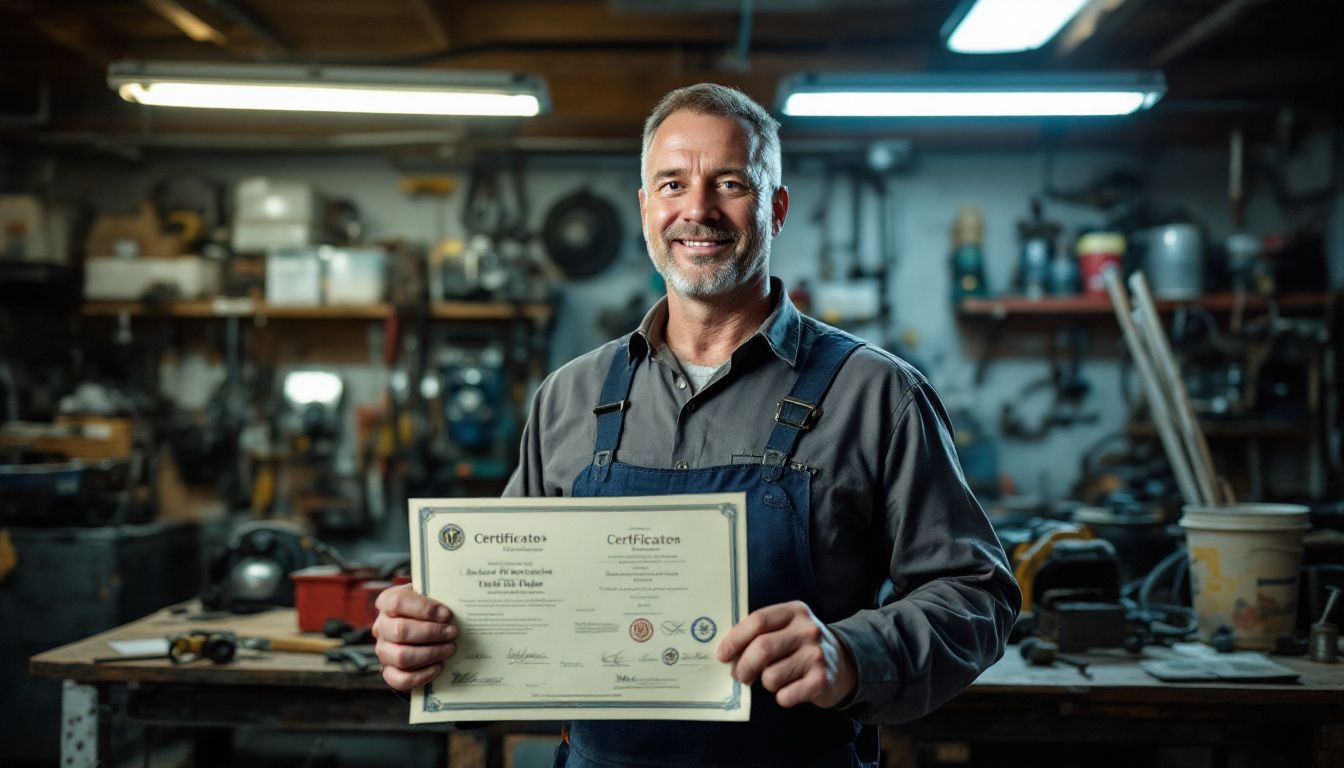Are you finding it hard to advance in the welding industry? Welding certifications can lead to higher salaries and more job opportunities. This guide explains the different types of welding certifications and how to earn them.
Start your journey to success today.
Key Takeaways
- Welding certifications from AWS validate your skills in methods like arc and TIG welding, making you recognized worldwide.
- Certified welders earn higher salaries; in 2020, the median annual pay was about $44,000, with potential increases through certifications.
- Various certifications are available, including Certified Welder (CW) for beginners and Certified Welding Inspector (CWI) for quality assurance.
- Certification costs range from $30 to $1,355, depending on the type and membership status with AWS.
- Certifications enhance job opportunities and ensure you meet safety and industry standards, leading to more stable careers.
What are Welding Certifications?
 Welding certifications verify a welder’s skills and knowledge. The American Welding Society (AWS), founded in 1919, offers these credentials. Certifications cover welding methods like arc welding and TIG.
Welding certifications verify a welder’s skills and knowledge. The American Welding Society (AWS), founded in 1919, offers these credentials. Certifications cover welding methods like arc welding and TIG.
They show that a welder meets industry standards. Certified welders gain credentials recognized worldwide. These certifications are transferable, letting welders work in various fields or locations.
AWS standards clearly define the difference between qualified and certified welders.
A welding certification is your ticket to a successful welding career.
Benefits of Obtaining Welding Certifications
Obtaining a welder certification can lead to higher salaries and more job opportunities. Certified welders are in high demand, which means better job stability. Employers trust certified professionals because they have passed rigorous certification tests.
This trust can help you qualify for more welding job positions and negotiate higher pay.
Professional certifications show your commitment to growth and give you a competitive edge in the job market. They make your resume stand out and prove your skills to potential employers.
Furthermore, having certifications can reduce recertification costs over time, saving you money. Being a certified welder enhances your qualifications and supports long-term career success.
Types of Welding Certifications
Welding certifications come in various types, each matching specific skills and job roles—learn which one suits your career next.
Certified Welder (CW)
The Certified Welder (CW) program tests your welding skills without any prerequisites. You show your ability to perform specific welding tasks. This helps prove your welder qualification to employers.
The test costs $55 for new applicants and $30 for renewals. Use AWS Certification QuikCheck or NRCW to manage your certification. Earning the CW can boost your employment chances and salary.
Certification opens doors to better opportunities and higher pay in the welding industry.
Certified Welding Inspector (CWI)
Certified Welding Inspectors ensure welds meet safety and quality standards. CWIs use welding codes and perform inspections to maintain high quality. To become a CWI, you must pass a computer-based exam at an AWS Exam Center.
The certification costs $1,100 for AWS members and $1,355 for non-members. Endorsements allow CWIs to specialize in areas like radiography or pipe welding. This certification boosts your credentials in weld quality assurance and inspection.
Next, explore other types of welding certifications.
Certified Welding Educator (CWE)
Transitioning from the role of a Certified Welding Inspector (CWI), the Certified Welding Educator (CWE) credential focuses on teaching and training future welders. Earning a CWE requires a fee of $795 for AWS members and $1,050 for non-members.
To maintain the certification, educators must renew it annually, costing $360 for members and $615 for non-members.
AWS offers valuable resources, including articles on welding topics and exam tips, to support aspiring educators. Veterans can use G.I. Bill benefits to assist with certification costs.
Becoming a CWE enhances your ability to lead welding training programs and contributes to the growth of the metal fabrication industry.
Certified Resistance Welding Technician (CRWT)
Moving forward from the Certified Welding Educator (CWE), the Certified Resistance Welding Technician (CRWT) plays a crucial role in the welding industry. CRWTs specialize in electric resistance welding, a process that joins metal by applying pressure and heat generated from electrical resistance.
To become a CRWT, candidates must pass a certification exam, which costs $380 for AWS members and $505 for non-members. This certification ensures technicians can handle resistance welding equipment safely and effectively.
CRWTs use tools like the Certified Welder Maintenance Portal to manage their certifications. They adhere to strict industry standards set by organizations such as the American Welding Society (AWS).
Accredited testing facilities support CRWTs by providing the necessary resources for certification. Holding a CRWT certification opens doors to various positions in manufacturing and production, where precise welding techniques are essential.
This certification also helps professionals stay updated with the latest welding procedures and safety regulations.
Certified Radiographic Interpreter (CRI)
Transitioning from the role of a Certified Resistance Welding Technician (CRWT), the Certified Radiographic Interpreter (CRI) plays a crucial part in welding inspections. CRIs use radiographic methods to examine welds for defects without causing damage.
This type of nondestructive testing ensures the quality and safety of welded structures.
Becoming a CRI involves passing a certification test that costs $870 for AWS members and $1,125 for non-members. The American Welding Society (AWS) oversees the certification process with the help of over 1,500 volunteers on more than 300 boards.
This certification enhances your qualifications, making you valuable in roles that require detailed weld inspections and interpretation.
Certified Welding Supervisor (CWS)
The Certified Welding Supervisor (CWS) certification helps professionals lead welding teams effectively. It costs $585 for members and $673 for non-members. With the Bureau of Labor Statistics predicting an 8% growth in welder demand from 2020 to 2030, earning a CWS can boost your career.
This certification includes training in management, safety regulations, and various welding processes. Certified Welding Supervisors ensure projects meet industry standards and maintain high-quality work in welding shops.
Certified Welding Engineer (CWE)
Building on the leadership skills of a Certified Welding Supervisor (CWS), a Certified Welding Engineer (CWE) takes welding expertise to the next level. A CWE designs welding processes and ensures they meet technical standards.
To become a CWE, candidates must pass four parts of the exam managed by the AWS Qualification & Certification Committee. Parts 1 and 2 cost $585 for members and $675 for non-members.
Parts 3 and 4 are $625 for members and $715 for non-members. This certification covers areas like metallurgy, design, and welding technology. Earning a CWE credential opens doors to advanced engineering roles and higher-paying positions in the welding industry.
How to Obtain Certifications
Obtaining a welding certification can boost your career. Follow these steps to become certified.
- Choose a Certification Organization
Select an organization like AWS, ASME, or API. These groups offer recognized certifications. - Select the Right Certification Type
Decide which certification fits your goals. Options include Certified Welder (CW) or Certified Welding Inspector (CWI). - Enroll in a Welding Education Program
Join a trade school or technical program. Earn a diploma or certificate in welding. - Gain Hands-On Experience
Build practical skills through apprenticeships or on-the-job training. Experience is crucial for certification tests. - Prepare for Certification Tests
Study welding principles and practice different welding types like GTAW and SMAW. Understand test requirements for positions like 6g pipe welding. - Register with an Accredited Testing Center
Contact AWS accredited testing centers to sign up for exams. Ensure you meet all prerequisites. - Take the Certification Exam
Complete both written and practical parts of the test. Demonstrate your welding skills and knowledge. - Maintain Your Certification
Renew your certification as needed. Stay updated with industry standards and continue gaining experience.
Expert Insights on Welding Certifications
Welding professionals say that certifications open doors to better job opportunities. Certifications prove a welder’s skills and expertise. The American Welding Society offers various certifications, such as Certified Welder (CW) and Certified Welding Inspector (CWI).
In 2020, welders earned a median annual pay of about $44,000, which can increase with certifications. Employers prefer hiring certified welders because it ensures quality and safety on the job.
Experts also note that certifications work as evidence of proficiency and can lead to career advancement. Becoming a certified welder shows dedication and mastery of different welding types, like gas tungsten arc welding and metal arc welding.
Certification tests assess skills in areas such as pipe welding and structural steel. These professional credentials help welders qualify for specialized positions and adhere to industry standards.
Adherence to Local Safety Regulations and Industry Standards
Expert insights highlight the importance of following safety rules and industry standards. Adhering to local safety regulations ensures welders work safely and produce quality work.
Organizations like AWS, ASME, API, ABS, MIL-STD, and DOT set these standards. AWS offers Certified Robotic Arc Welding Testing Centers to help welders certify their skills. State and local codes also play a role in maintaining safety on the job.
By obtaining certifications, welders meet these regulations and qualify for more welding positions. This commitment improves the overall industry and supports continuous growth.
Following industry standards means using the right techniques and equipment. Certified Welding Inspectors (CWI) ensure that welding meets all safety and quality requirements. Pipe welding certifications, such as those for the 6g position, are essential for specialized jobs.
Certifications from the European Federation for Welding, Joining and Cutting also recognize high standards. Complying with these rules protects workers and ensures projects meet specifications.
This dedication to safety and standards makes the welding profession reliable and respected.
Conclusion
Welding certifications open doors to better jobs and higher pay. They prove your skills to employers and make you stand out. With various types like CWI and CRWT, you can find the right path for your career.
Certified welders enjoy more stability and opportunities. Start your certification today and achieve success in welding.
For more in-depth insights and professional advice on welding certifications, visit our expert welding guide.
FAQs
1. What are the different types of welding certifications?
Welding certification types include stick welding, tig welded, flux cored arc welding, and fusion welding. Each type tests specific skills through welding certification tests to ensure welders meet industry standards.
2. How can I become a certified welder?
To become a certified welder, enroll in a certified welder program, gain welding experience, and pass welder qualification tests. Certifications can help you qualify for more welding jobs and advance your career.
3. What is a welding inspector certification?
Welding inspector certification, like the Certified Welding Inspector (CWI) certification, trains you to identify welding positions and inspect welds according to technical standards. This certification is offered by organizations such as the American Society of Mechanical Engineers.
4. What does the 6g pipe welding certification mean?
The 6g pipe welding certification is the highest level for welding steel pipe in the 6g position using a tig torch. It requires mastering welding in all positions and passing rigorous welding tests to ensure high-quality welds.
5. How do welding certification tests work?
Welding certification tests assess your ability in different welding types and positions, such as 1g, 2g, 5g, and 6g pipe welding certification positions. These formal assessments ensure you meet the specifications and technical standards required in the United States.
6. How can certifications help advance my welding career?
Certifications can help by providing professional welding certifications that qualify you for more welding jobs, including specialized roles like welding inspector. They demonstrate your skills in areas like plate welding certifications and resistance welding experience, making you a more attractive candidate to employers.
Mobile Welding Services at Your Location
For professional mobile welding, contact us at (623) 263-0277. Visit us today for efficient on-site welding services wherever you need them!

